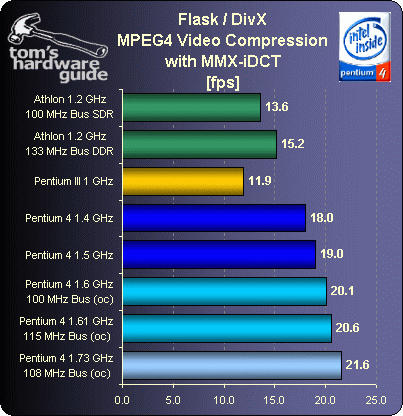Important Pentium 4 Evaluation Update
Are Our Initial MPEG4 Results Not Meaningful?
Yesterday I received an alarming email from Toby Hudon, who expressed his doubts about the validity our MPEG4-benchmarking results:
| I assume the source files to be encoded to MPEG-4 in most of your benchmarks are high bit rate MPEG-2 similar to what's on most DVDs. One thing many people are unaware of is that the selection of what kind of iDCT is used to do the DECODE phase has a big impact on the final output.FlaskMPEG has 3 settings for this, in the Export settings video tab:MMX iDCTFast integer iDCTIEEE reference full precision FPU iDCTThe default is MMX. However, this tends to produce a lot of artifacts in the final MPEG-4 video because all the pixel values of the decoded frames are approximations. Thus when a second DCT transform is applied to convert it to MPEG-4 it tends to approximate again and produce really horrible artifacts in some cases.Using the IEEE decode eliminates most of these artifacts and produces an output that rivals most DVDs when set to about 20% of the original bit rate (1.5mbps for a 7.5mbps DVD like Matrix). This is on the large side for full movies but fine for TV episodes and music videos.The problem is, this is an FPU based operation, whereas the default decode is an integer or MMX-based operation. As we can see, P4 is much faster than Athlon at the default settings but what about in a pure FPU mode that most people doing high quality rips would use? I'd expect a reversal of scores more like the 3D Studio MAX results.Can you please run a small test comparing the speeds of the current top CPUs (Athlon 1.2 P3 1.0, P4 1.5) in each decoder mode? I'd like to see how they perform so I can pick the one right for my applications. |
I pointed out earlier, that I am very aware of the responsibility Tom's Hardware is carrying as a premium technical publication. Every doubt that a reader expresses about our benchmarking scores is looked into immediately and with the outmost care. Toby's concerns are making a whole lot of sense, because we obviously want the MPEG4-benchmark scores to be useful to those people who are actually doing DVD-rips. It is not hard to assume that the majority of DVD-rips are supposed to produce the best possible quality and so it obviously became questionable to me if our benchmarks, that were indeed carried out using the MMX-iDCT, are actually helpful to those who really do MPEG4-encoding. As a result I rushed to repeat the MPEG4-benchmarks runs with the IEEE-iDCT to find exactly the results, which Toby had been able to forecast by simply drawing logical conclusions.
The New MPEG4-Encoding Situation
Before I get into the new results, I would like to point out that our initially published MPEG4-encoding benchmark scores were not wrong, but I had used the default MMX-iDCT setting, assuming that it is the iDCT used by the majority of DVD-rippers. However, you may remember that those results published on Monday were showing Pentium 4 as the clear winner of the MPEG4-benchmark, which had been an important issue to me for drawing my final conclusions about Pentium 4.
Those are the initial results we published. Pentium 4 is obviously way ahead of the competition, seemingly due to its high memory bandwidth and surprisingly powerful MMX-engine.
Get Tom's Hardware's best news and in-depth reviews, straight to your inbox.
Current page: Are Our Initial MPEG4 Results Not Meaningful?
Prev Page The Most Controversial X86-Processor Of All Time Next Page The New MPEG4-Encoding Situation, Continued